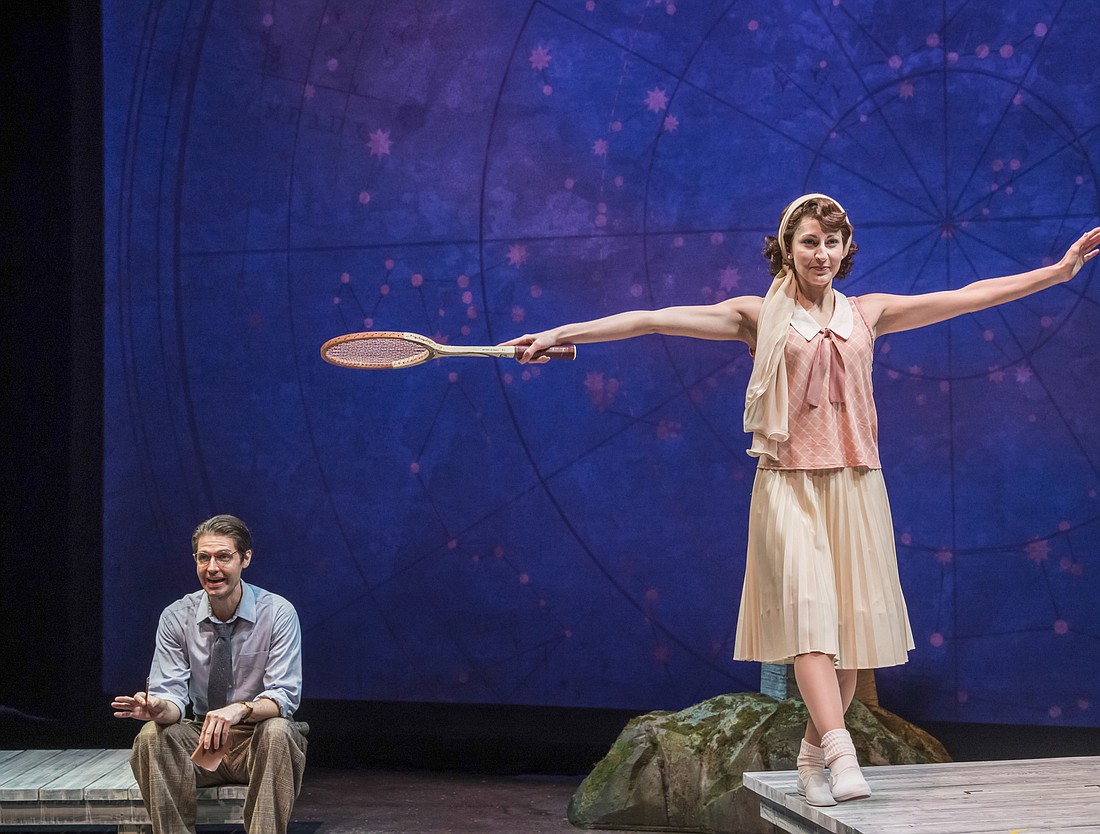- May 23, 2025
-
-
Loading

Loading

Matthew Burnett’s “Theophilus North” brings the quirky hero of Thornton Wilder’s final novel to life on stage. His hero’s journey is underway in the first Dog Days Theatre production of the summer.
The journey begins in 1926. Theophilus (Brett Mack), resigns from his teaching job at a New Jersey prep school, buys a used jalopy and heads north to see the world. The young man gets as far as Newport, R.I. before his car dies. Then as now, that island community was an enclave of the rich and famous, with a satellite population of poor, unknown servants. Theophilus is marooned there until he can afford to fix his car. He makes do with a bicycle, and makes ends meet with a series of odd jobs. Theophilus proves to be a human Swiss Army knife. He morphs into tennis instructor, a French teacher, a dramatic reader and a philosophical confidante. His jobs become more than jobs. Like the hero of “Amélie,” he has a magical gift for giving people exactly what they need.
Theophilus helps a teenage boy (Dylan Crow) navigate the waters of French verb conjugations and puberty. He helps his precocious sister (Ally Farzetta) see the power of her mind. He reads literary classics to a shut-in, pregnant wife (Alex Pelletier), and helps her earn the power of self-respect and stand up to her philandering husband. His Socratic discussions with another shut-in (Don Walker) convince the elderly man that he’s not at death’s door — and life still awaits outside his door. He stops an impulsive heiress (Ally Farzetta) from eloping with a chemistry teacher.
In the course of his good deeds, Theophilus crosses paths with a brace of interesting characters — and they’re not all human. In the playwright’s imaginative conceit, the actors also portray automobiles, lighthouses and landmarks.
Sounds delightful? It is. But theatrically, delight is a fragile package. Handle with care, or it’ll shatter in a million delightful pieces.
Director Laura Braza delivers — and the play’s fragile charm arrives in one piece. She coaxes nuanced, sympathetic performances from the seven actors playing multiple roles.
Mack’s is charismatic without being self-important in this title role. (His Theophilus is magical, but he doesn’t know it.) Walker’s housebound philosopher is delightful when he rediscovers his zest for life. Pelletier is appalling as the philosopher’s daughter who’s shut him off from life — and appealing as the adulterer’s ailing, pregnant wife. (She’s also a hoot as the ailing old car.) Dylan Crow is a ball of awkward comedy as a teenage lad in the no-man’s land of puberty. Farzetta shines as his precocious sister and a stuck-up socialite. Roxanne Fay is dryly comic as the unofficial leader of the servant community. Andrew Bosworth gets his own share of laughs as her unofficial sidekick, a Cockney butler who knows the town’s secrets.
These quirky characters get their time in the sun with Michael Pasquini’s dreamy lighting and Dee Sullivan’s suitably upscale Jazz Age costumes. Steven Kemp’s scenic design is evocative and as minimal as it gets. There are no sets to speak of. The actors are the sets.
It adds up to an idyllic character study in the spirit of “Our Town.” That applies to all of Newport’s denizens. But Theophilus’ growth is the heart of the play. It’s also the invention of the playwright.
Burnett gives Theophilus more of a character arc than you’ll find in Wilder’s novel. In the book, he never doubts his magic or himself. The book’s Theophilus never grows; he doesn’t have to. The play’s Theophilus has a doubting dark night of the soul — and questions if his good-intentioned help was merely meddling. Ah, but he gets over it — and finds himself. And the whole human race in the process.
Theophilus finally shines, once he realizes he’s not a lonely star. He’s part of a constellation of human connections. Thanks to that epiphany, their stories flood into his mind, and he starts writing. The play never spells it out. But it’s clear that once he’s started, Thornton Wilder’s imaginary brother will never stop.